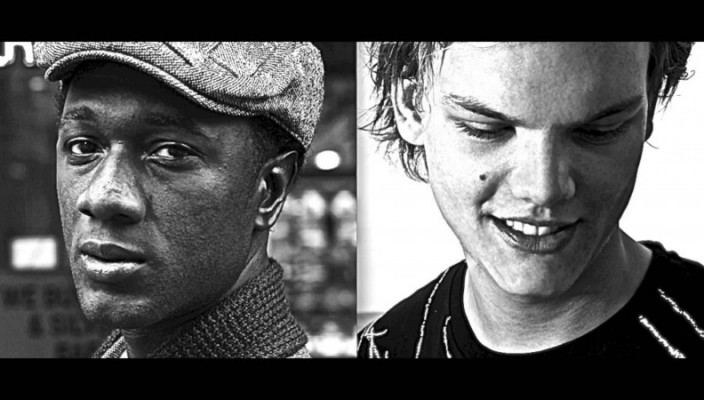
Summer 2013 finds electronic dance music (EDM) festivals as popular as ever in America, and as well, “Wake Me Up” – Swedish EDM producer Avicii’s (above, right) latest single with indie soul crooner Aloe Blacc – burning up the UK charts and already selling over one million units. The song’s blend of current rock’s fascination with jug band sounds blended with R & B may represent the best example of a progressive take on the “convention defying” black rock ideal.
Regarding the top DJ/producer (and unintentionally assessing the future of the idea of “black rock”), noted rap critic Andrew “Noz” Nosnitsky astutely tweeted
a black avicii will swarm over the land and devour everything #blackavicii
— noz (@noz) June 4, 2013
If accepting of the black rock aesthetic, then due to the white, pop and Euro-house stigma attached to EDM, this concept may initially appear fallacious. However, the concept is definitely intriguing, and begs the question of if the time has come for progressive black musical culture to accept EDM as the future of progressive black music to assist in #blackavicii’s rise?
The definition of culture has evolved. Typical lines of white v. black no longer exist as digital access for everyone to everything makes the dissemination of sound and style occur in radical permutations, often by the second. Thus, it can be argued a rapidly digitizing universe has morphed the notion of “black rock” as the organic space from which the world’s musical progression emanates into a “universal rock” ideal, black culture (and black people) possibly being lost in the undertow.
As electronica-era giants the Chemical Brothers once stated in naming a popular 2002 track, “It began in Afrika”, the great starting point for all music is the drum. The drum’s strength has weaved its way both north and south in the Americas, then moving east and west worldwide, arguably its greatest significance as a bearer of messages of strength during the struggles by native peoples against European militarism. Thus, though electronic dance music absolutely has black stars, it may have stumbled out of the gate in gaining the support of the black rock community by initially appearing on the surface as yet another white European invasion of the world.
As compared to the reactionary push of rock’s dual British invasions of the Beatles and the Sex Pistols, as well as even disco and house exploding, then spawning techno and electronica, EDM was possibly a far more surprising uprising. However, if a subscriber to the notion of the black rock ideal and intrigued by embracing EDM, there are a few top options for you to consider as your personal #blackavicii and sonic salvation.
Afrojack

Once dating Paris Hilton (and ultimately introducing her to DJing) aside, Dutchman Afrojack is a global superstar and a pioneer of the “Dutch house” sound that parlays the African influence in Dutch culture into a drum-heavy sound that feels similar to Fela Kuti at an accelerated pace. Need an obvious place to start with becoming an Afrojack fanatic? Listen to Major Lazer’s 2009 classic “Pon de Floor.” Diplo and Switch’s track benefits from none other than Afrojack himself creating the track’s signature rumbling bassline.
David Heartbreak

David Heartbreak is an American producer from Charlotte, NC now signed to Skrillex’s OWSLA label. Formerly a rapper, it was his work in slowed Dutch house-meets-reggaeton genre moombahton with Dominican Dutch producer Munchi that started his career. From exploring moombahton’s soulful edge to creating EDM powered by drum programming that owes more to Hank Shocklee and reggae legend King Tubby than Calvin Harris or Dillon Francis, he keeps classic rap’s revolutionary style at the forefront, without selling it out to festival-ready dance.
The US’ 12th Planet and UK’s Joker have slowed in their dubstep output of late, but the former’s work on tracks like “Youth Blood” and “Burst” sound like synth-laden 80s R & B and swagged-out hip-hop respectively. Joker’s “Digidesign” is the progenitor in so many ways to lo-fi dance’s step into the mainstream arena and is deserving of a listen as well.
Flying Lotus

Flying Lotus is a bass mastermind unto himself. Born Steven Ellison, the producer’s 2012 album Until the Quiet Comes is a standout work that in being moody, soulful and iconoclastic recalls more of a feeling of “FlyLo”-as-Miles Davis more than anything else. Free of style and free in genre, his tracks are truly the stuff of instant legend.
#blackavicii needs black rock, and black rock absolutely needs #blackavicii. In embracing each other, it’s an acknowledgement of the past, acceptance of the present and preservation of the strength of both eras for a potentially more vibrant and creative future for the black rock ideal.

